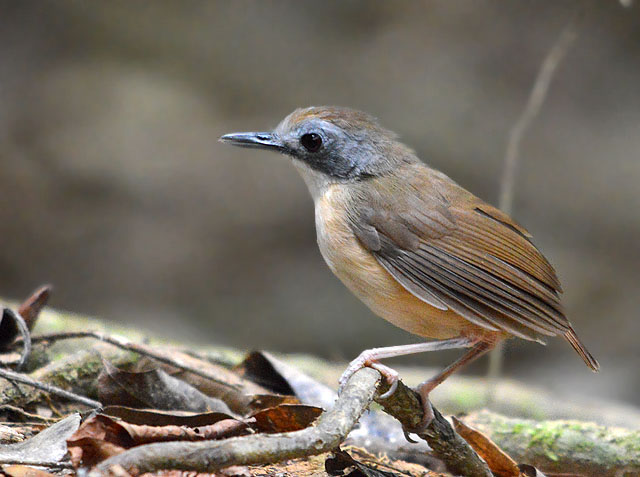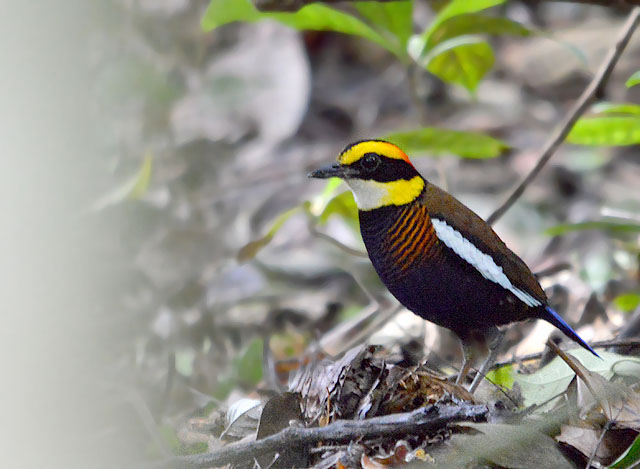The drive from Cameron Highlands to Taman Negara Sungai Relau took
slightly more than 2 hours. In order to reach our destination at first light, we
embarked on our journey well before dawn. The cold mountain air and endless winding
road could not dampened my spirit. It has been 7 years since my last visit to
this birding paradise and I was savouring all the birding delights that are to
come. When we finally reach our destination, the national park looked pretty
much the same to me and that was certainly a good thing.
There is, however, one very noticeable difference. A small herd of
Bantengs now roam the park headquarters compound. These native cattle are part
of some reintroduction program and the freedom that they get to enjoy is
because they are as tame as any domestic cattle can be.
The lone bull, although not as huge and intimidating as his bigger
cousin the Gaur, is an impressive animal nevertheless. I would certainly not
fancy bumping into a wild one in the forest.
Beyond this iron bridge lies Mother Nature’s gift to birders. The
forest here is home to a magnitude of beautiful and intriguing species. It is a
little piece of heaven on Earth that is more than capable of making a seasoned
birder feel like a rookie birder all over again – overwhelmed by new and incredible
birding sensations.
Ben and I had two and a half days of pure birding here. Taman Negara
has never once disappointed me and it was not about to start now. We put in
several hours of hide birding and photography each day and the results were
quite satisfactory. This post will feature all the birds we obtained while
staking out in the hides. The White-rumped Shama is one of the most confiding
species we encountered. Famed for its divine singing abilities, this species is
heavily trapped throughout the country. Fortunately for them, they are safe
here from trappers as long as they stay within the boundaries of the park. The
male not only sings well or also possesses a beautifully long tail. That is why
it kills me to see them cramped inside cages. Although the cages used to house
shamas are bigger than usual, they still rob these amazing birds of their birth
given right – to serenade the natural world with their beauty and song.
We also had a chance to photograph the less impressive female...
And a juvenile completes the family album...
Yellow-bellied Bulbuls are not your typical bulbul. They have a
preference for the lower levels of the forest. Being skulkers by nature, good
views are somewhat a privilege. However with the aid of a hide and a little patience,
we had plenty of that on this faithful trip.
They also have a tendency to behave like babblers with their vocal
nature and foraging habits. Lacking the delicate-looking body structures of the
canopy bulbuls, the Yellow-bellied Bulbul are certainly built for the treacherous
and competitive life near the forest floor.
Being able to observe and photograph any babbler out in the open is
already a blessing. And to get it up close and personal as well is beyond
words. Babblers that frequent the forest undergrowth like the Short-tailed
Babblers are notoriously difficult to observe and photograph. Hide birding can
be taxing at times. Fortunately, the antics of these stump-tailed terrestrial
birds kept us entertained whenever they were present.
Adorable as they may be, appearances can be deceiving. There is no
doubt these birds are full of character. And they can be feisty at times too.
These two individuals apparently could not see eye to eye. When all the
displaying and threat posturing could not settle the dispute, a more physical
approach had to be taken...
I have relatively few encounters with the Ferruginous Babbler
despite the fact that they do occur in the neck of woods where I usually bird.
Shy and active, most of my encounters are brief or obstructed views. You will not
able to truly appreciate its beauty until you have a good look at it in the
open. Graceful-looking and with a very pleasant combination of colours, the
Ferruginous Babbler is a true hidden treasure of the forest.
The babbler’s upperparts is rusty coloured and much to the agony of
birders, blends reasonably well with undergrowth vegetation. Its call like most
babblers, is the usual tell tale sign of its present. Here in Taman Negara
Sungai Relau, the single note call is frequently heard throughout the vicinity
indicating the presence of a healthy population.
Hide birding is not as comfortable as it appears to be. Although you
are seated and in the shade, the humidity and heat and as well as the cramped
space will get to you sooner or later. And don’t forget the waiting part.
Boredom will set in as quickly as the mosquitos and if you are unlucky, leeches
too. But the main reason for putting ourselves through all this is a family of
birds that undoubtedly is one of the most enigmatic and sought after in the
tropics – pittas!
Both the Garnet and Malayan Banded Pitta are present at this birding site.
We heard both of them every single day of our visit. The former is supposedly
the commoner of the two but we are dealing with wild animals here and things do
not always work out according to expectations. We only had one quick glimpse of
the dazzling plumage of the Garnet Pitta in the end. However, much to our
delight, the Malayan Banded Pitta provided a slightly longer view. Even when it is
partly hidden by vegetation, this male made me giddy and quiver with
anticipation.
I am not much of a praying person but at that moment, I got down on
my knees and said a silent prayer. And it was answered. The male Malayan Banded Pitta
hopped into full view. Now, the Giant Pitta may be the most revered of our
Malaysian pittas due to its near mythical status but when it comes to aesthetic
appeal, the male Malayan Banded Pitta has no equals. The flaming orange eyebrow and midnight
blue underparts contrasting sharply with the orange breast bands is a sight
that will be eternally embedded into your memory. This may not be my first
experience with this alluring bird but it is by far the best.
Two shots was all that I was allowed to take. And just like that,
the male Malayan Banded Pitta hopped back into the cover of the undergrowth leaving
behind a vivid memory of splendour and beauty. He was not alone. But his mate
only offered quick glimpses throughout the encounter. I should be thankful that
Murphy sat this one out and it was the duller female that gave us the slip. Birding
from a hide may not be my usual cup of tea but for a chance to observe this
pitta I would be willing to step out of my comfort zone. Taman Negara Sungai Relau
has so much more to offer than just hide birding and the birds we encountered
while exploring other parts of the park will be covered in my next post.




























2 comments:
Beauty Hope mating start soon !!
Thank you, Mike!
Post a Comment